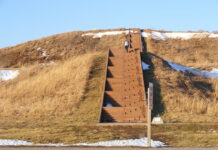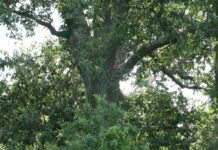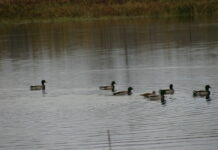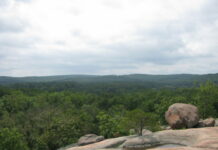Photo credit: DiasporaEngager (www.DiasporaEngager.com).
Discussion
Although vaccination against SARS-CoV-2, influenza, and RSV reduces severe disease from these respiratory viruses in populations at high risk,§§§ coverage with each of the three vaccines, especially updated (2023–2024) COVID-19 and RSV vaccines, was low among nursing home residents. Compared with COVID-19 vaccination coverage among adults aged ≥65 years and RSV vaccination coverage among adults aged ≥60 years reported by the National Immunization Survey (NIS) Adult COVID-19 Module (37.4% and 17.0%, respectively), COVID-19 and RSV vaccination coverage reported to NHSN was lower among nursing home residents (33.1% and 9.8%, respectively). In contrast, influenza vaccination coverage among nursing home residents (72.0%) was slightly higher than that among the general adult population aged ≥65 years (69.3%) (5). Although data from NHSN and NIS cannot be directly compared because of different methodology and populations, these directional differences deserve further exploration.
Vaccine fatigue, defined as inaction toward vaccine information or instruction attributable to “perceived burden and burnout” (6), inaccurate health information, and vaccine hesitancy (7) contribute to lack of vaccine demand, especially in areas with a high SVI (8). For all three vaccines, coverage among nursing home residents was lowest in the most socially vulnerable counties. Lower coverage in areas with higher social vulnerability might be related to challenges to vaccine access and cost and payment barriers associated with COVID-19 vaccine commercialization.¶¶¶
The low RSV vaccination coverage relative to the other two vaccines might be driven by the relative recency of the recommendation, vaccine fatigue associated with the introduction of a fourth respiratory vaccine (in addition to influenza, COVID-19, and pneumococcal), implementation challenges with adding new vaccines, and the recommendation being based on shared clinical decision-making between a patient (or patient’s guardian) and a health care provider (4). Facilities have had limited time to train providers to implement a shared clinical decision-making recommendation and develop processes and policies to support RSV vaccine administration. Nursing home staff members might also be less familiar with the risk for RSV outbreaks and severe disease among residents (9). Increasing awareness of RSV as a cause of disease among nursing home residents might facilitate increased coverage.
In addition, these data highlight the success that can be achieved through surveillance and coordinated public health efforts to address barriers. During the 2023–2024 season, influenza vaccination coverage among nursing home residents was significantly higher than updated (2023–24) COVID-19 vaccination and RSV vaccination coverage. Annual influenza vaccination has been universally recommended since the 2010–11 influenza season,**** and CMS requires nursing homes to educate residents about and offer both influenza and COVID-19 vaccination. Notably, coverage with all three vaccines was highest in small nursing homes, suggesting that medical directors and other providers at these small facilities with lower patient-to-provider ratios might be best able to build trust with residents and families and mitigate barriers to vaccination coverage. HHS Region 8, driven largely by North Dakota and South Dakota, achieved relatively high coverage among nursing home residents with all three vaccinations because of robust relationships and frequent, persistent, clear communication among nursing homes, health care systems, state and local health departments, and pharmacies;†††† similar strategies might have the potential to improve vaccination coverage in other states. CDC is also engaged in efforts to increase vaccination coverage, including sharing NHSN surveillance data with state and local health departments and CMS Quality Innovation Networks-Quality Improvement Organizations to guide targeted outreach and educational efforts in nursing homes with lower vaccination coverage, contacting facilities with high coverage to learn about and promote successful strategies employed, working with national organizations that represent nursing homes to help educate staff members and residents, responding to barriers by developing a Healthcare Provider Toolkit to facilitate vaccination and conduct webinars with partners,§§§§ collaborating with CMS leaders to communicate reported billing barriers, and collaborating with CMS Quality Innovation Networks-Quality Improvement Organizations to increase vaccine confidence and demand.
Limitations
The findings in this report are subject to at least three limitations. First, although it is mandatory for facilities to report COVID-19 vaccination coverage to NHSN, reporting of influenza and RSV vaccination coverage is optional, and the proportion of facilities reporting was low. Facilities that elected to report these data might be more likely to offer influenza or RSV vaccines. However, similarities in distribution of a small number of important facility demographics suggest that facilities voluntarily reporting these data might be representative of all facilities. Second, this analysis was conducted using aggregate, facility-level data reported to NHSN; therefore, vaccination coverage could not be directly examined by person-level covariates such as age, race, and ethnicity. Further, this limitation means that RSV vaccination coverage was calculated among all residents, not just the approximately 91% of residents aged ≥60 years (10). It is likely that RSV vaccination coverage among residents aged ≥60 years was higher than the overall coverage. Finally, NHSN does not collect data on the outcome of shared clinical decision-making discussions or reasons for declining vaccination.
Implications for Public Health Practice
There is an urgent need to protect nursing home residents against severe outcomes of respiratory illnesses through continuing effective strategies to increase updated COVID-19 vaccination and influenza vaccination coverage and discussing RSV vaccination as an option among nursing home residents during the ongoing 2023–24 respiratory virus season. Health care providers should counsel residents that immunizations are the most effective way to prevent severe outcomes from COVID-19, influenza, and RSV and offer recommended immunizations.¶¶¶¶ It is important for nursing homes to collaborate with state and local health departments, federal agencies, and partners to address low vaccination coverage. Because vaccination coverage varied by vaccine type, region, SVI, and facility size, ongoing surveillance of vaccination coverage among nursing home residents remains essential to help guide timely efforts to increase vaccination in this population at high risk and address inequities.
Source of original article: Centers for Disease Control and Prevention (CDC) / MMWR (Journal) (tools.cdc.gov).
The content of this article does not necessarily reflect the views or opinion of Global Diaspora News (www.GlobalDiasporaNews.com).
To submit your press release: (https://www.GlobalDiasporaNews.com/pr).
To advertise on Global Diaspora News: (www.GlobalDiasporaNews.com/ads).
Sign up to Global Diaspora News newsletter (https://www.GlobalDiasporaNews.com/newsletter/) to start receiving updates and opportunities directly in your email inbox for free.


































